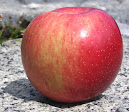Last weekend I had the pleasure of a tasting tour through an orchard of 119 heirloom apple varieties.
This remarkable collection, conserved and curated by the Worcester County Horticultural Society, lives today at the Society's center at Tower Hill in Boylston, Massachusetts.

|
| Worcester Horticultural's Joann Vierra in action. |
For more than an hour we walked from tree to tree while volunteers cut slices of apples fresh off the bough, the autumn sun and breezes in our faces and hair.
Meanwhile the society's horticultural director, Joann Vieira, told us about the apples, quoting Spencer Beech's Apples of New York extensively.
Apples
These including doughty Blue Pearmain, fruity Sutton, Ribston Pippin wild and strong, wonderful old Esopus Spitzenberg, and vinegary (but pleasant) Deacon Jones.
Also Fallawater (strangely watery), and tart, lively Ortly—which could show Granny Smith and Newtown Pippin a thing or two about snap and crunch.

|
| Fallawater |
Tower Hill hosts these tours every Columbus Day weekend. An unusual growing season and recent high winds conspired to reduce the number of apples available this year, but the experience was still memorable.
History
The collection was started during the Depression by S. Lothrop Davenport to preserve old varieties at risk of extinction. For many years the collection's principal location was at Old Sturbridge Village before it was moved to Tower Hill.As part of its conservation mission, today the collection provides heirloom budwood essentially at cost. A short history of the collection is online.
Update: As of 2018, budwood is at least temporarily no longer available. I've substituted an archived page for the above link
The facility at Tower Hill is impressive and full of delights, with a visitors center, an orangery, a large outdoor garden, and walking trails with impressive views of Wachusett Mountain and Reservoir.

|
The ambiance is studiedly neo-Victorian, with statues, formal gardens, a belvedere, and a folly. A limonaia and other additions were under construction during our visit.
Also, many heirloom varieties were for sale after the tour. Stay tuned.
Update: There were actually two parties in the orchard at the same time that day, and as it happens another blogger took the other tour, led by Tower Hill volunteer Rick Kimball. Here is her evocative account.

I've grown a number of these old apples. Unfortunately, for history and nostalgia, few of them compare favorably taste wise with the best of todays apples. Not when todays are allowed to ripen on the tree.
ReplyDeleteIMHO and your YMMV.
@ anonymous above: It's a fair point that many of these old varieties have not survived because they were not very good, or because they were similar to other types that were easier to grow.
ReplyDeleteNobody seems to miss dry old Ben Davis. Having tried one on this tour, I do not see why anyone would prefer Stillawater. By all means, let's not romanticize them.
On the other hand there are some great old varieties, victim of the mass market that rewards only the "best" apple (as determined by popular taste in the grip of advertising campaigns), and the devil take everything else.
Consider also that people have different tastes in apples. The ones I like would be rated tart by modern standards (but they are not particularly).
But rather than a taste tyranny that would force us all to eat Honeycrisps (or, were I King, Macouns) and nothing else, I prefer an orchard of many flavors and textures. The threat to heirlooms, and to diversity of taste in general, comes from a mass market that refuses to allow degustibus non est disputantum.
...and another thing: even dull-tasting apples may have a part to play. Without dry old Ben Davis, there'd have been no Cortland, the offspring of Ben and McIntosh.
ReplyDeleteSo, I am for conserving as much genetic diversity as possible.
There are a few apple enthusiasts in my area in Maine who have over 147 different varieties on about 120 trees, some are just limb grafts on all bud 9. These people are by no means a full time farmer like myself, however they chose to preserve these varieties for personal satisfaction and to gift scionwood at our annual exchange at MOFGA ( I have a certified farm and we steadily planting a large heirloom orchard for the next few years) here is the link. http://www.mofga.org/Default.aspx?tabid=301
ReplyDeleteWe also do an Apple day on october where everyone bangs varieties to taste and Apple enthusiasts do lectures as well. Preserving. Our bedrooms is very important to many people, from farmers to family's. I really enjoy your blog and will email.you soon.
Dave
David, thank you for sharing this information. Maine is a wonderful place for apples and the origin of many fine old varieties. I hope to get up to Great Maine Apple Day some October.
ReplyDeleteYou are the second reader this month to post a comment with information about scionwood in a comment (the other is here). This is the time of year to plan an orchard or garden and buy (or swap) bud wood, and clearly a post about that is overdue.